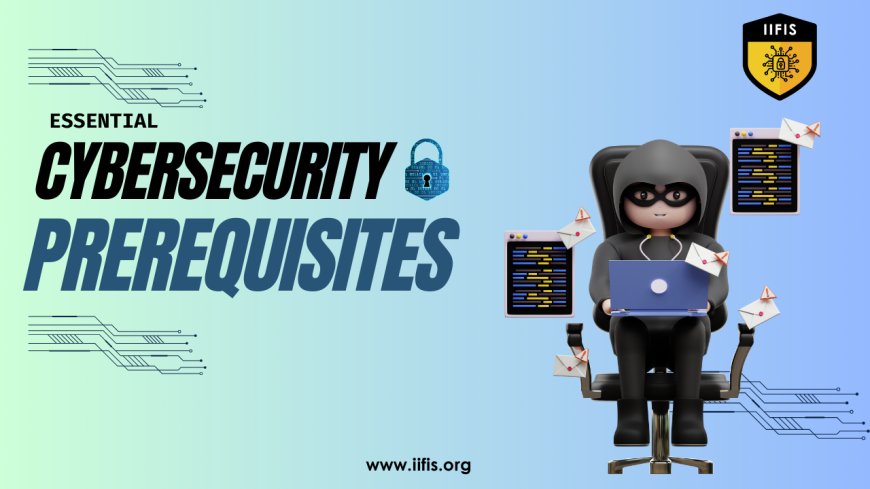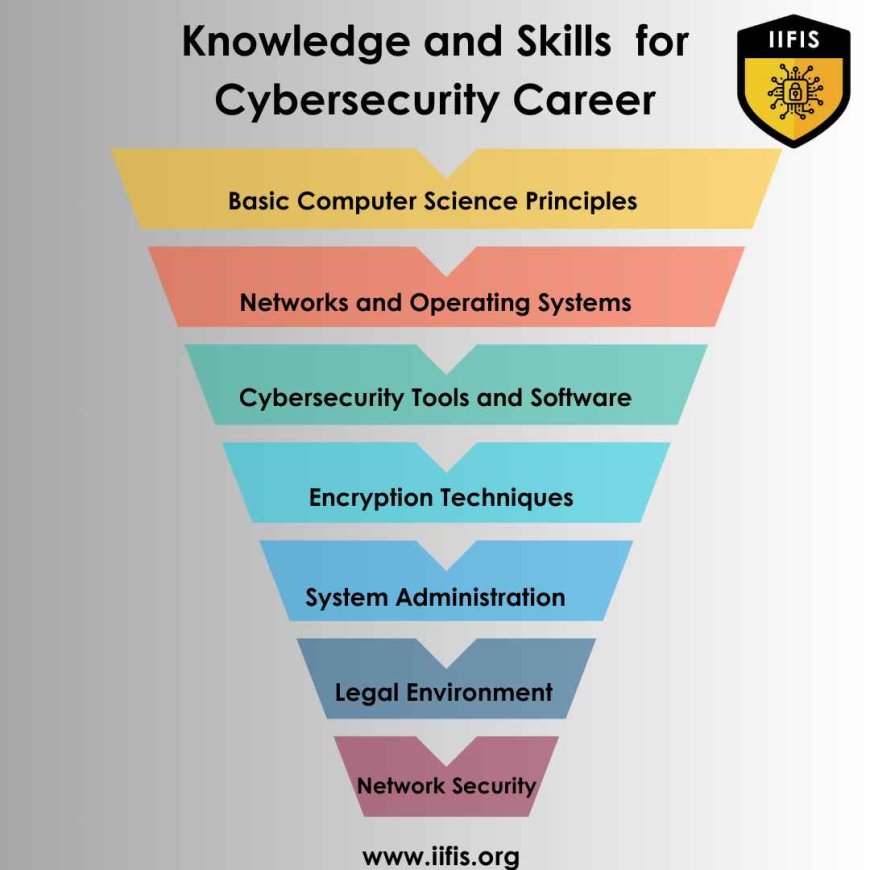A Guide to Essential Cybersecurity Prerequisites
Learn how to protect your online stuff! Get the basics for better Cybersecurity. Keep your digital things safe and sound.

Cybersecurity focuses on protecting computers, networks, and data from harmful digital attacks. It's essential because it helps keep information safe and ensures that computer systems work properly. Cybersecurity is a vital field that focuses on the protection of computer systems, networks, and data from digital attacks, unauthorized access, and damages. In today’s interconnected world, a cybersecurity certificate is not just a technical necessity but also a critical component in safeguarding organizations' and nations' economic and strategic interests.
Cybersecurity involves measures to protect against cyber threats, including securing both the hardware and software of computers, maintaining the privacy of data, and continuously monitoring systems to respond quickly if something goes wrong. Various sectors like banking, healthcare, and education rely on cybersecurity to keep their information safe.
Barriers to Ensuring Adequate Cybersecurity
Ensuring robust cybersecurity is increasingly challenging due to several factors:
1. Complex and Interconnected Systems: As digital systems become more complex and interconnected, ensuring comprehensive cybersecurity becomes harder. The vast web of networks means that vulnerabilities in one area can potentially compromise many others.
2. Shortage of Skilled Professionals: There is a significant shortage of trained cybersecurity professionals. This gap makes it difficult for organizations to manage their cybersecurity needs effectively. With the stakes so high—especially when it comes to protecting sensitive data—having skilled personnel is crucial.
3. Evolving Cyber Threats: Cyber threats are constantly changing and becoming more sophisticated. To keep up, cybersecurity strategies must also evolve. This requires ongoing vigilance and the continuous updating of knowledge and practices to guard against new types of attacks.
These challenges highlight the need for improved strategies, better training and education in cybersecurity, and a proactive approach to managing the ever-changing landscape of cyber threats.
What basic knowledge and skills are needed for a cybersecurity career?
To start a career in cybersecurity, certain foundational knowledge and skills are essential:
Foundational Knowledge and Skills
-
Basic Computer Science Principles: It's important to have a solid grasp of how computers and software work. This includes understanding algorithms, data structures, and the basic workings of operating systems.
-
Networks and Operating Systems: Knowing how networks are set up and how data flows across them is crucial. Familiarity with different types of operating systems, such as Windows, macOS, and Linux, is also important.
-
Legal Environment: Understanding the relevant privacy laws, compliance requirements, and the ethical issues surrounding cybersecurity is necessary. This helps in ensuring that the security measures adhere to legal standards and ethical practices.

Technical Skills:
-
System Administration: Managing and configuring computer systems and servers effectively.
-
Network Security: Protecting network systems from unauthorized access and threats.
-
Encryption Techniques: Using encryption to secure data and communications.
-
Cybersecurity Tools and Software: Gaining familiarity with the tools and software used for monitoring, preventing, and responding to security threats.
These skills form the backbone of a cybersecurity professional’s expertise and are critical for effectively protecting computer systems and networks from threats.
Requirements for a Cybersecurity Framework
When setting up an effective cybersecurity framework within an organization, several strategic and organizational steps are necessary:
Strategic and Organizational Prerequisites
-
Comprehensive Cybersecurity Strategy: Develop a clear cybersecurity strategy that fits well with the organization’s overall business goals. This strategy should address all aspects of security, from prevention to response.
-
Training and Awareness Programs: Regular training for all employees is essential. These programs should educate staff about common cyber threats, such as phishing and malware, and teach them how to protect themselves and the organization’s assets.
-
Incident Response Protocols: It's important to have established procedures for responding to security breaches. These protocols should enable the organization to quickly identify, respond to, and recover from cybersecurity incidents, minimizing their impact.
These steps help ensure that cybersecurity measures are not only technically sound but also integrated with the broader operational and strategic goals of the organization.
How can individuals and organizations prepare for emerging cyber threats?
To stay prepared against new cyber threats, both individuals and organizations need to take proactive steps and keep learning. Here’s how:
For Individuals
-
Stay Informed: Keep up with the latest news about security threats.
-
Use Strong Passwords: Create strong, unique passwords for your accounts and use a password manager if needed.
-
Enable Multifactor Authentication: Use multifactor authentication to add an extra layer of security.
-
Update Regularly: Keep your software and devices updated to protect against new threats.
For Organizations
-
Regular Risk Assessment: Regularly check for cybersecurity risks to stay ahead of potential threats.
-
Employee Training: Hold regular training sessions to teach employees about the latest cyber threats and how to avoid them.
-
Incident Response Plan: Have a plan in place to quickly deal with and reduce the impact of any cyberattacks.
-
Invest in Security Tools: Use good cybersecurity tools to detect and prevent threats.
-
Collaborate and Share Information: Work with other companies and groups to share information about threats and best practices.
Continuous Learning and Adaptation in Cybersecurity
Keeping up with the ever-evolving landscape of cyber threats requires a commitment to continuous learning and adaptation. Here’s how you can stay informed and ready:
1. Stay Updated with Trends and Threats
-
Regular Reading: Follow cybersecurity news sites, and blogs, and subscribe to industry reports. Some good sources are Krebs on Security, Dark Reading, and Threatpost.
-
Cyber Threat Intelligence: Use tools that provide updates on new threats and vulnerabilities. Check regularly with organizations like the Cybersecurity and Infrastructure Security Agency (CISA) and the National Institute of Standards and Technology (NIST) for the latest information.
2. Pursue Ongoing Education and Certifications
-
Certifications: Work towards certifications such as CISSP (Certified Information Systems Security Professional), CEH (Certified Ethical Hacker), or CompTIA Security+. These credentials help you understand important aspects of cybersecurity.
-
Specialized Training: Attend sessions focused on areas like penetration testing, network defense, or incident response to deepen your knowledge in specific areas.
3. Engage in Professional Development
-
Forums and Communities: Join online communities and forums, such as Reddit’s r/cybersecurity, Stack Exchange, and local cybersecurity meetups. Engaging in conversations with others in the field can provide valuable insights and solutions.
-
Workshops and Conferences: Participate in workshops, webinars, and conferences like Black Hat, DEF CON, and RSA Conference. These events are great for learning from experts and seeing demonstrations of the latest tools and techniques.
-
Networking: Build relationships with other professionals in cybersecurity. Networking can help you learn new best practices and stay up to date with industry trends.
-
Continuous Practice: Regularly participate in capturing the flag (CTF) competitions and lab exercises. Websites like Hack The Box, TryHackMe, and OverTheWire offer practical challenges that help you keep your skills sharp.
By continuously learning and adapting, you can enhance your cybersecurity skills and better protect your organization against cyber threats.
In conclusion, a proactive and well-rounded approach to cybersecurity is essential. Continuous learning and staying informed are necessary as cyber threats keep evolving. Both individuals and organizations must commit to protecting digital assets. Start by understanding and implementing basic cybersecurity measures to safeguard against threats.
























